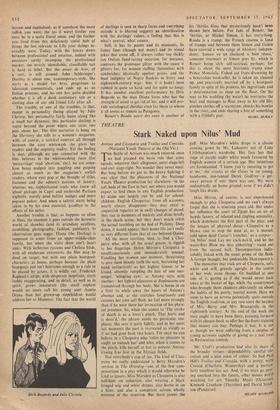One of the. most impressive qualities of The Company She
Keeps is the range of the narra- tive—the stumbling, episodic journey of the New York bluestocking Margaret Sargent, towards some sort of precarious salvation. In all of Mary McCarthy's novels the line between auto- biography and fiction seems to be a narrow one, but in The Company She Keeps the various stations of Margaret Sargent's cross from the first broken marriage through banal, unsatisfac- tory affairs to the final reckoning with a psy- chiatrist possess.a detachment much too objective for an autobiography. Yet the demands of the. central character's sensibility are never sub- ordinated to the claims of the secondary charac- ters; we never forget that 'in these private theatricals it was her own many-faceted nature' she put on exhibit . . . this was a play where the donnee was real, and the penalty for a missed cue or an inopportune entrance was, at first any- way, unthinkable. . . .' Moreover, front the opening episode of the clandestine affair which sends Margaret out West for a divorce, there is the growing development of the theme that the officially emancipated life can be an iron maiden as constricting as the bourgeois, Catholic up- bringing from which Margaret is fleeing: She could take an apartment• by herself in the Village. She would meet new people, she would entertain. But, she thought, if I have people in for cocktails, there will always come the moment when they have to leave, and I shall be alone and haveto pretend to have another engagement in order to save embarrass- ment Then there will be the evening, at home. with a good book when there will be no reason at all for going to bed, and I shall per- haps sit up all night. .. . Then there will be the dinners in tearooms with other unmarried women, tearooms because women alone look conspicuous and forlorn in good restaurants. And then, she thought, I shall get older. . . .
Hardly any surprise, therefore, that the divorce is followed by a job in the Saville Gallery, an imposing name which covers 'two small dark, stuffy rooms' and where the proprietor, Mr. Sheer, is a shyster Margaret has even to keep in dimes for telephone calls. Yet the sordidness of such bit-jobs is surpassed by the downward spiral of the, two affairs with the man in the Brook Brothers shirt and the Yale intellectual on the progressive weekly. Indeed, the seduction in the railway compartment on the trip out West re- volves around the unfortunate assumption that 'the man in the Brooks Brothers shirt with apparent progressive sympathies who confronts
*Penguin. 44.
Yet Margaret Sargent finds it even harder to earn self-approval with her brief affair with the Yale man who works with her on the Liberal weekly. For Jim Barnet is even worse than a rich boy, he is an intellectual hollow reed, and when Liberal is taken over by the Stalinists— an excellent account here of the bureaucratic machinations that rout the liberals-- he finds his true billet on Destiny newsmagazine. Jim still votes for Roosevelt, but Margaret realises 'he could never forgive her. Through her he had lost his primeval innocence, and he would hate her forever as Adam hates Eve. . . .' Both the betrayal (and the self-betrayal) are almost com- plete. Even the resources of personal relation- ships, personified in the 'genial host' of the, cosmopolitan publisher, Pflaumen, are come to ' nought, for although the Slaters, the Berol- zheimers and Jack Peterson, the critic, come to dinner, 'you saw that it was indeed a house of assignation, where business deals, friendships, love affairs were arranged, with Pflaumen, the promoter, taking his inevitable cut. . . .' Thus the quest of Margaret Sargent for her identity has failed; husband, lovers, intellectuals, left- wing politics, Liberal magazine, even personal relations through Pflaumen's world, have all proved a sham.
Yet the ultimate episode of The Company She Keeps, the confrontation with Dr. James, the psychiatrist in 'Ghostly Father, I Confess,' resolves both the narrative structure and the heroine's problem, as Margaret Sargent at last learns how to accept herself. Freud soon de- molishes Marx, and so destroys the compulsion to make indiscriminate political affiliations. 'her proletarian sympathies constituted a sort of snub that she administered to the middle class, much as a really smart woman will outdress her friends by relentlessly underdressing them.' But before Freud is then rationalised away through the com- plicity of Dr. James, there comes the long-sought moment of abreaction with the re-creation of the fears Of her childhood and adolescence, crys- talising around the dominant father who returns to disturb her once some measure of per- sonal success is achieved. He can only be exor- cised by marrying, for the second time, an older man, to prove to herself that freedom is still hers —an ordeal so hazardous that she risks severe neurosis. Yet only by this test will the compul- sion to assert herself, to know herself, be satisfied.
Now for the first time she saw her own ex- tremity, saw that it was some failure in, self- love that obliged her to snatch blindly at the love of others, hoping to love herself through them, borrowing their feel4ngs as the moon borroWed light. She herself was a dead planet . .
This concluding 'duologue between Margaret and Dr. James is not merely a Freudian find-the- trauma, a novelist's sleight-of-hand to tie up the ends of a particularly complex personality hunt. In the first place, there is a truly satisfac- tory treatment of the central character, a treat-






























 Previous page
Previous page